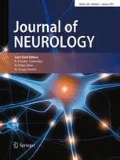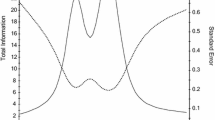Abstract
The aim of this study was to investigate the presence of thoughts or wishes for the end of life in patients with Huntington’s disease (HD) or identified gene carriers (further mentioned together as patients). A custom-made questionnaire, based on previous qualitative research, was sent out to 242 patients with HD and identified gene carriers. Presence of wishes was investigated and correlated to demographic and clinical characteristics. A total of 134 patients (55 %) returned the questionnaire. 101 respondents (75 %) reported to have some kind of thoughts or wishes for the end of life. For 15 respondents (11 %) these thoughts concerned care; 86 respondents (64 %) reported to have also thoughts about euthanasia or physician-assisted suicide (PAS). The presence of any thoughts about the end of life was significantly related to being familiar with HD in the family, but not related to any other demographic or clinical variable. Participants with thoughts specifically about euthanasia or PAS were of higher education and in earlier stages of the disease than participants without such thoughts. Thoughts or wishes for the end of life are present amongst patients with HD. These thoughts include euthanasia or PAS in a majority of the respondents. It is suggested that prudential addressing of these issues may enhance the doctor–patient relationship.

Similar content being viewed by others
References
(2002) Termination of life on request and assisted suicide act
van Tol DG, Rietjens JA, van der Heide A (2012) Empathy and the application of the ‘unbearable suffering’ criterion in Dutch euthanasia practice. Health Policy 105(2–3):296–302
van der Heide A, Onwuteaka-Philipsen BD, Rurup ML, Buiting HM, van Delden JJ, Hanssen-de Wolf JE et al (2007) End-of-life practices in the Netherlands under the Euthanasia act. N Engl J Med 356(19):1957–1965
Griffiths J, Weyers H, Adams M (2008) Euthanasia and Law in Europe. Oxford and Portland. Hart publishing, Oregon
Borgsteede SD, Deliens L, Graafland-Riedstra C, Francke AL, van der Wal G, Willems DL (2007) Communication about euthanasia in general practice: opinions and experiences of patients and their general practitioners. Patient Educ Couns 66(2):156–161
de Boer ME, Hertogh CM, Droes RM, Jonker C, Eefsting JA (2010) Advance directives in dementia: issues of validity and effectiveness. Int Psychogeriatr 22(2):201–208
de Boer ME, Droes RM, Jonker C, Eefsting JA, Hertogh CM (2011) Advance directives for euthanasia in dementia: how do they affect resident care in Dutch nursing homes? Experiences of physicians and relatives. J Am Geriatr Soc 59(6):989–996
Dees MK, Vernooij-Dassen MJ, Dekkers WJ, Elwyn G, Vissers KC, van WC (2013) Perspectives of decision-making in requests for euthanasia: a qualitative research among patients, relatives and treating physicians in the Netherlands. Palliat Med 27(1):27–37
(1993) A novel gene containing a trinucleotide repeat that is expanded and unstable on Huntington’s disease chromosomes. The Huntington’s Disease Collaborative Research Group. Cell 72(6):971–983
Fisher ER, Hayden MR (2013) Multisource ascertainment of Huntington disease in Canada: prevalence and population at risk. Mov Disord
http://www.cbs.nl. 2014
Booij SJ, Engberts DP, Rodig V, Tibben A, Roos RA (2013) A plea for end-of-life discussions with patients suffering from Huntington’s disease: the role of the physician. J Med Ethics 39(10):621–624
Booij SJ, Rödig V, Engberts DP, Tibben A, Roos RAC (2013) Euthanasia and advance directives in Huntington’s disease: qualitative analysis of interviews with patients. J Huntingtons Dis 2(3):323–330
Britten N (1995) Qualitative interviews in medical research. BMJ 311(6999):251–253
Strauss AL, Corbin J (1998) Basics of qualitative research: techniques and procedures for developing grounded theory. Sage Publications, London
Groenvold M, Petersen MA, Aaronson NK, Arraras JI, Blazeby JM, Bottomley A et al (2006) The development of the EORTC QLQ-C15-PAL: a shortened questionnaire for cancer patients in palliative care. Eur J Cancer 42(1):55–64
Shoulson I, Fahn S (1979) Huntington disease: clinical care and evaluation. Neurology 29(1):1–3
Unified Huntington’s Disease Rating Scale: reliability and consistency. Huntington Study Group. Mov Disord 1996 Mar;11(2):136-42
Folstein MF, Folstein SE, McHugh PR (1975) “Mini-mental state”. A practical method for grading the cognitive state of patients for the clinician. J Psychiatr Res 12(3):189–198
van Delden JJ, van der Heide A, van de Vathorst S, Weyers H, van Tol DG (2011) Kennis en opvattingen van publiek en professionals over medische besluitvorming en behandeling rond het einde van het leven Het KOPPEL-onderzoek. ZonMW, Den Haag
Rurup ML, Pasman HR, Onwuteaka-Philipsen BD (2010) Advance euthanasia directives in dementia rarely carried out. Qualitative study in physicians and patients. Ned Tijdschr Geneeskd 154:A1273
Dupuis HM (2000) Professional autonomy: a stumbling block for good medical practice. an analysis and interpretation. Theor Med Bioeth 21(5):493–502
Jochemsen H, Ten Have H (2000) The autonomy of the health professional: an introduction. Theor Med Bioeth 21(5):405–408
Gastmans C, De Lepeleire J (2010) Living to the bitter end? A personalist approach to euthanasia in persons with severe dementia. Bioethics 24(2):78–86
Hardwig J (1997) Is there a duty to die? Hastings Cent Rep 27(2):34–42
Rurup ML, Onwuteaka-Philipsen BD, van der Heide A, van der Wal G, Deeg DJ (2006) Frequency and determinants of advance directives concerning end-of-life care in The Netherlands. Soc Sci Med 62(6):1552–1563
Dellefield ME, Ferrini R (2011) Promoting excellence in end-of-life care: lessons learned from a cohort of nursing home residents with advanced Huntington disease. J Neurosci Nurs 43(4):186–192
Aghababaei N, Wasserman JA (2013) Attitude Toward Euthanasia Scale: Psychometric Properties and Relations With Religious Orientation, Personality, and Life Satisfaction. Am J Hosp Palliat Med 30:781–785
Leppert W, Gottwald L, Majkowicz M, Kazmierczak-Lukaszewicz S, Forycka M, Cialkowska-Rysz A, et al. (2012) A comparison of attitudes toward euthanasia among medical students at two Polish Universities. J Canc Educ:1–8
Bulow HH, Sprung CL, Baras M, Carmel S, Svantesson M, Benbenishty J et al (2012) Are religion and religiosity important to end-of-life decisions and patient autonomy in the ICU? The Ethicatt study. Intensive Care Med 38(7):1126–1133
Becker J, Hart dJ (2006) Godsdienstige veranderingen in Nederland. Verschuivingen in de binding met de kerken en de christelijke traditie. Den Haag: Sociaal en Cultureel Planbureau
Acknowledgments
We thank all patients for their participation in this study. There was no funding involved.
Ethical standards
The study protocol was approved by the Medical Ethics Committee of the Leiden University Medical Center (MEC LUMC registration number P11.035).
Conflicts of interest
None declared.
Author information
Authors and Affiliations
Corresponding author
Rights and permissions
About this article
Cite this article
Booij, S.J., Tibben, A., Engberts, D.P. et al. Thinking about the end of life: a common issue for patients with Huntington’s disease. J Neurol 261, 2184–2191 (2014). https://doi.org/10.1007/s00415-014-7479-4
Received:
Revised:
Accepted:
Published:
Issue Date:
DOI: https://doi.org/10.1007/s00415-014-7479-4




